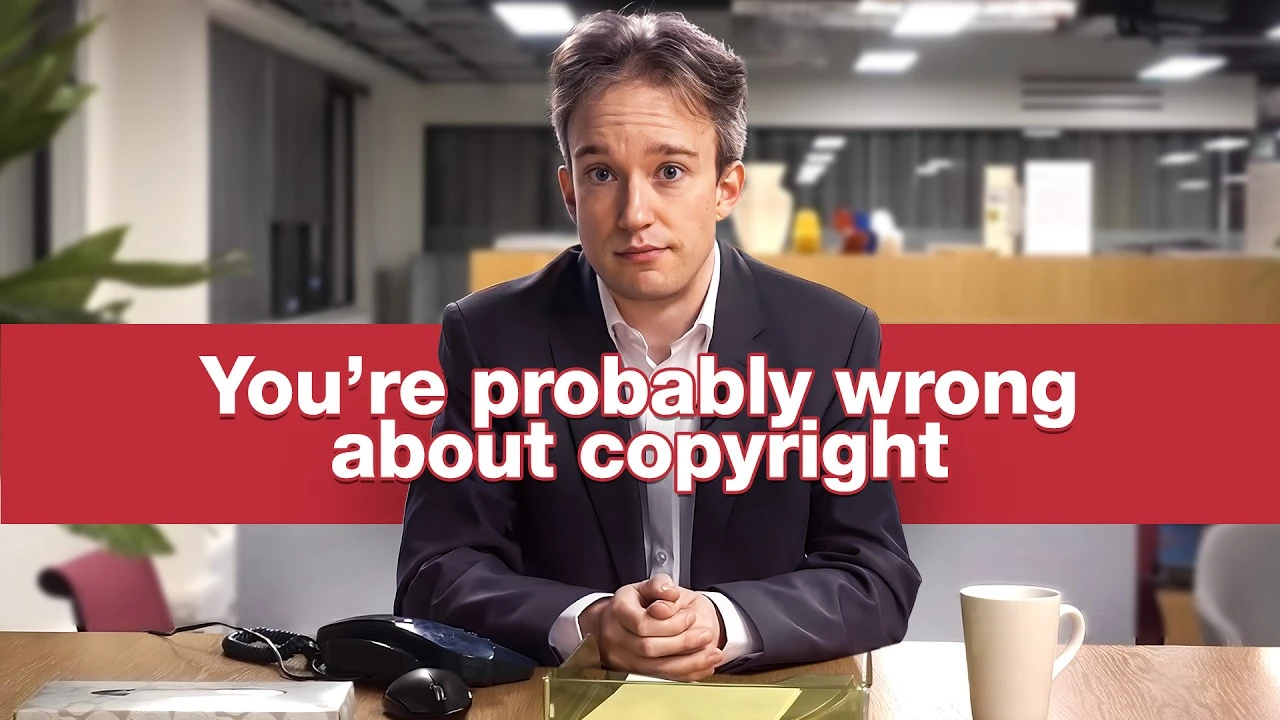So recently there has been a lot of debate on AI-generated art and its copyright. I’ve read a lot of comments recently that made me think of this video and I want to highly encourage everyone to watch it, maybe even watch it again if you already viewed it. Watch it specifically with the question “If an AI did it, would it change anything?”
Right now, AI-generated works aren’t copyrightable. https://www.artnews.com/art-news/news/ai-generator-art-text-us-copyright-policy-1234661683/ This means you can not copyright the works produced by AI.
I work in games so this is more seemingly relevant to me than maybe it is to you. https://techcrunch.com/2023/07/03/valve-responds-to-claims-it-has-banned-ai-generated-games-from-steam/ Steam has outright said, earlier this month, that it will not publish games on its platform without understanding if the training data has been of images that aren’t public domain.
So right now, common AI is producing works that are potentially copyright-infringing works and are unable to be copyrighted themselves.
So with this information, should copyright exist, and if not, how do you encourage artists and scientists to produce works if they no longer can make a living off of it?



It’s not misinformation:
So this means work generated by AI is not copyrightable. The work generated by human touch is. https://www.federalregister.gov/documents/2023/03/16/2023-05321/copyright-registration-guidance-works-containing-material-generated-by-artificial-intelligence which is the original source of your post.
“You can not copyright works produced by AI.” is a 100% true and factual statement. You can have the AI work as a part of a bigger thing that you retain the copyright on or you can modify it and retain copyright on only the modifications but the AI work in itself is not copyrightable and your copyright on the bigger thing doesn’t supersede the lack of the copyright on the AI works.
So in the case in question where someone used AI work to generate images for a comic book. The comic book itself is under copyright but anyone can take those images and modify them, redistribute them without credit, etc. Just like if you used AI images for textures in a game, the game is under copyright but those textures could be lifted out of the game and used elsewhere.
There are no AI works that fit this description though. When most people think of AI works they’re thinking of the former, not the latter. So saying “Right now, AI-generated works aren’t copyrightable.” without making the distinction is misinformation designed to spread doubt.
There are AI works every day that fit that description. The art in question in the comic book case was not modified and could be taken from the page and used somewhere else with the exception of the words.
You are arguing in bad faith by implying that my intent is to spread doubt through misinformation. Don’t assume things like that. You have no clue of my intentions.
I’m not trying to “spread doubt”. I’m simply giving the information as is. If you want to have a conversation about the facts, let me know. If you are here to argue in bad faith then I can’t help you.
Where does the article you linked it say this?
The registrar does say this though.
I’m not accusing you of arguing in bad faith or intentionally spreading information, I’m letting you know that you’re repeating the talking points of those who do.
Literally the next lines.
The copyright of the comic as a product is one thing, the copyright of the individual images is another.
Well, I am letting you know you are at this point, clearly ignoring the videos, and articles, and even not reading the article you’ve linked. As the article you even linked states clearly.
So you could go take the images out of the comic book and reuse them because they are not copyrighted.
You’re begging the question by assuming such content hasn’t been modified and could be taken in the first place. How would you know the content you’re eyeing is usable without violating any rights or laws?
Copyright law is one big “It depends” making sweeping statements like made and the headline of the article you linked are oversimplifying the issue and presenting a false dichotomy of a much more nuanced issue. The Reuters article I linked presents much less biased coverage that doesn’t gloss over important facts.
It really isn’t, because copyright law, in basically all countries AFAIK, requires a human to have made the work. So you do not hold copyright for works generated by an AI. All of the sources agree on this.
Humans using the machines have always been the copyright holders of any qualifying work they create.
Sure, when they are creating the creative aspect of the work, not when the machine does. A work of a human can attain copyright, a work by machine cannot.
This is important. I also question the idea that copyright law might be “broken.” It might need an update, as most laws do, simply because it’s behind the times. The whole conception of this video is to spread doubt, from its sensationalist headline to the content, from which you have extracted the key points of it that wish to spread doubt. Legal systems worldwide need to catch up and develop as fast as technology and software develops now. That’s the problem. Nothing broken here. Outdated? Perhaps.